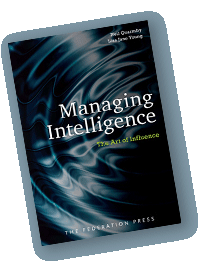ADDITIONAL MATERIALS FROM 'THE ART OF INFLUENCE' |
| It
turns out that we wrote so much for Managing Intelligence: The Art of
Influence that we had to pare it back
significantly during editing. Below are three sections that Neil wrote, they were originally intended as appendices.
These documents may be used for any non-commercial, non-profit
purpose. |
| |
|
|
|
|
|
|
|
|
|
|
| |
ARTICLES FROM OTHER AUTHORS |
|
| Influencing decision-makers |
| |
| In
this article, Dr Jerry Ratcliffe details the theory and reality of
intelligence efforts to influence decision-makers in the context of law
enforcement. He defines the role and describes the difficulties of
identifying decision-makers for analysts. Ratcliffe outlines the
importance of understanding intelligence issues from the
decision-maker's point of view, also for analysts to understand the
reality that intelligence is just one of many voices in the broader
decision-making context. |
| |
| Source |
Ratcliffe, JH. (2008). Chapter 7 in
Intelligence-led
Policing (pp.
141-164). Sydney: Federation
Press. |
| |
| |
| At
arm's length or at the elbow?: Explaining the distance between analysts
& decision-makers |
| |
| Noted
intelligence scholar, Dr Stephen Marrin, uses the national
security setting to compare how intelligence contributes
to the decision-making process in the United States and
the United Kingdom. In the UK, raw intelligence material
if often provided direct to (or obtained by)
decision-makers. In the US, analysis is undertaken by
analytical staff who do not make decisions. Marrin
observes that the 'perfect' arrangement is illusory and
underscores the need for integration of analysis and
decision-making. |
| |
| Source |
Marrin, S. (2007).
Article
in International Journal of Intelligence and CounterIntelligence,
20(3), pp. 401-414. |
| |
| |
| Intelligence
management: Innovation & implications for management |
| |
| This chapter argues that in order to respond
to the changing operating environment, the intelligence leader and
manager need to equip themselves with a range of general and specialised
management skills. Largely absent in the growing literature on
intelligence theory and practice in the policing context (see for
example Ratcliffe, 2004; Maguire & John, 2006) is a discussion of
the specialised skills and attributes required to deal with leading or
managing an intelligence function. |
| |
| Source |
Walsh, PF. (2007). Chapter 5
in
M
Mitchell and J Casey (eds) Police
Leadership & Management (pp. 61-74). Sydney: Federation
Press. |
| |
| |
| Effectiveness of
police intelligence management: A New Zealand case study |
| |
| One of the only
research-based commentaries on intelligence management, this article is
the result of interviews with 50 decision-makers and intelligence staff
working with New Zealand Police. Ratcliffe notes the absence of clear
decision-making structures and a number of likely reasons for the mixed
perceptions regarding the value of the intelligence function. The
resulting themes of this research are common to law enforcement and
other sectors alike. |
| |
| Source |
Ratcliffe,
JH (2005). Article in Police
Practice & Research, 6(5), 435-451. |
| |
| |
| Intelligence
Management Model for Europe
|
| |
| This paper, produced following collaboration between representatives of Member States.
Experienced
in the fields of intelligence and analysis, specifically identifies the area of analysis for your consideration. It makes clear that this is
merely the first stage in the process of
developing an integrated intelligence management model for Europe. |
| |
| Source |
Association of European Police Colleges (2001) |
| |
| |
OTHER RESOURCES |
|
Intelligence
manager workshops
|
|
|
| Run
by the inimitable Don McDowell, the Intelligence Study
Centre has designed special workshop-length programs for
intelligence unit supervisors, as well as for line
managers and executives who are clients and users of
intelligence services. The objective of these workshops is
to familiarise participants with the process of
intelligence, focusing on how to task, manage and monitor
the activity and assess performance. |
| |
| Source |
Intelligence
Study Centre |
| |
| |
| |
